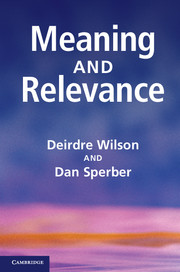Book contents
- Frontmatter
- Contents
- Figures
- Tables
- Preface
- Acknowledgements
- 1 Introduction
- Part I Relevance and Meaning
- Part II Explicit and Implicit Communication
- Part III Cross-Disciplinary Themes
- 12 Pragmatics, modularity and mindreading
- 13 Testing the cognitive and communicative principles of relevance
- 14 The why and how of experimental pragmatics
- 15 A pragmatic perspective on the evolution of language
- Notes
- References
- Index
14 - The why and how of experimental pragmatics
the case of ‘scalar inferences’
Published online by Cambridge University Press: 05 June 2012
- Frontmatter
- Contents
- Figures
- Tables
- Preface
- Acknowledgements
- 1 Introduction
- Part I Relevance and Meaning
- Part II Explicit and Implicit Communication
- Part III Cross-Disciplinary Themes
- 12 Pragmatics, modularity and mindreading
- 13 Testing the cognitive and communicative principles of relevance
- 14 The why and how of experimental pragmatics
- 15 A pragmatic perspective on the evolution of language
- Notes
- References
- Index
Summary
Although a few pioneers in psycholinguistics had taken an experimental approach to various pragmatic issues for more than twenty years, it is only in the past few years that investigators have begun using experimental methods to test pragmatic hypotheses (see Noveck and Sperber 2004). We see this emergence of a proper experimental pragmatics as an important advance, with great potential for further development. In this chapter we want to illustrate what can be done with experimental approaches to pragmatic issues by considering one example, the case of so-called ‘scalar inferences’, where the experimental method has helped sharpen a theoretical debate and provided uniquely relevant evidence. We will focus on work done by the first author and his collaborators, or work closely related to theirs, but other authors have also made important contributions to the topic (e.g. Papafragou and Musolino 2003; Guasti, Chiercha, Crain, Foppolo, Gualmini and Meroni 2005; De Neys and Schaeken 2007).
Methodological background: the limits of pragmatic intuitions as evidence
Theoretical work in pragmatics relies heavily – often exclusively – on pragmatic intuitions. These are rarely complemented with observational data of a kind more common in sociologically oriented pragmatics. Use of statistical data from corpuses or experiments is even less common. This is partly a result of the fact that most theoretical pragmaticists are trained in departments of linguistics, where linguistic intuitions are quite often the only kind of data considered. Optimally, of course, one would want pragmaticists to use whatever kind of data might significantly confirm or disconfirm hypotheses. Moreover, a sensible desire for methodological pluralism is not the only reason to diversify the types of evidence used in pragmatics. There are also principled limits to the use of pragmatic intuitions.
- Type
- Chapter
- Information
- Meaning and Relevance , pp. 307 - 330Publisher: Cambridge University PressPrint publication year: 2012
- 9
- Cited by

